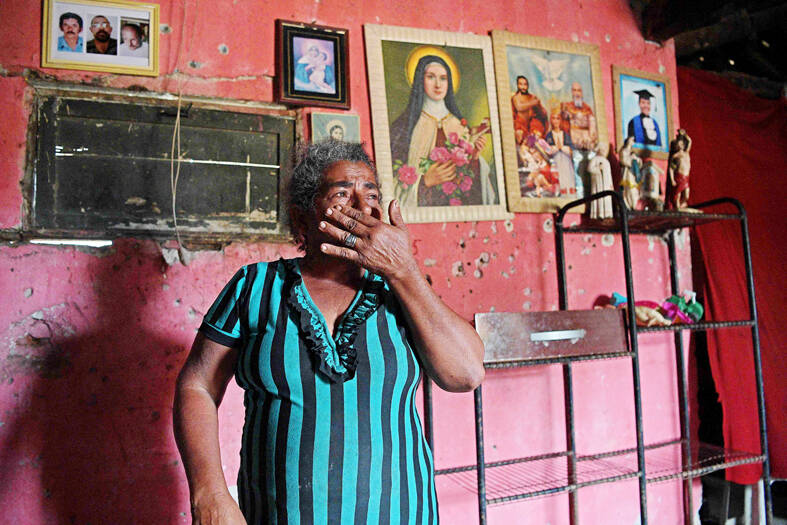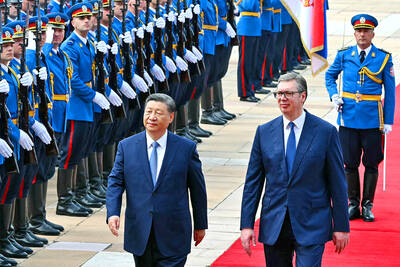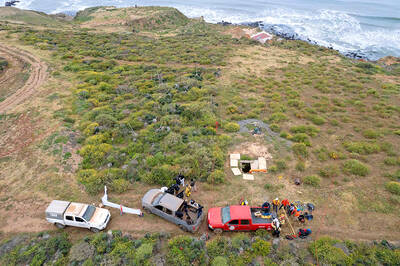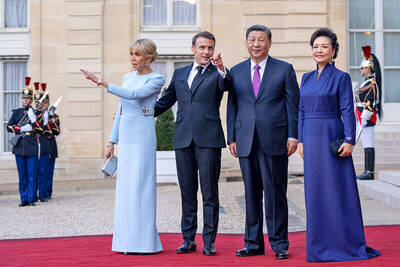In a small cement house crumbling to ruins in Brazil’s parched Sertao region, Maria da Silva, a graying matriarch struggling to feed her family, opens her empty refrigerator and breaks down in sobs.
The 58-year-old widow, whose creased brown face betrays her burdens, lost her family’s main breadwinner when her brother, who worked in Sao Paulo, died of COVID-19 last year.
Now she and her family of eight, who are squatting in an abandoned shack, are among the 33.1 million Brazilians living in hunger.

Photo: AFP
The figure — a 73 percent increase in the past two years, according to the Brazilian Network for Research on Food Security — has become the subject of a bitter political battle as Latin America’s biggest economy heads for elections on Oct. 2.
Holding a nearly empty can of powdered milk for the three young grandchildren who live with her, ages three, two and 15 months, Da Silva gives a tour of her dilapidated house, which has no bathroom or running water.
“There are times when [the children] ask for food and I don’t even have a biscuit or bread to give them,” she said through tears on the small plot of land the family farms in Pernambuco State’s Poco da Cruz.
Soaring food prices have forced the family to turn to begging, she said.
“I just pray to God to end my suffering,” she said.
The presidential front-runner, former Brazilian president Luiz Inacio Lula da Silva, regularly attacks Brazilian President Jair Bolsonaro over Brazil’s reappearance on the World Food Programme’s “Hunger Map” last year, with 28.9 percent of the population living in “moderate or severe food insecurity.”
It is a major setback for a country that had been removed from the map in 2014 after an economic boom and landmark social programs helped lift 30 million people from poverty during Lula’s administration.
Bolsonaro has accused Lula of bankrupting Brazil with corruption.
Courting low-income voters, the incumbent has upscaled and rebranded Lula’s signature welfare program, and is campaigning extensively in the impoverished northeast, home to one-quarter of Brazil’s 213 million people.
Sprawled across the northeastern interior, the Sertao, or hinterland, is a semi-arid expanse of brown-and-olive-green scrubland.
Known for cyclical droughts, it is a harsh, beautiful land with an outsize role in Brazilian literature, music and film.
Each generation there remembers its worst drought — 1960, 1993, 2010 — and the misery it caused.
Joao Alfredo de Souza, a community leader in the rural township of Conceicao das Crioulas, weathered all those.
“It cost us a lot of sweat and tears to overcome,” said De Souza, a spry 63-year-old who heads a community founded in the 18th century by former slaves.
Gesturing from his front porch to a paved street lined with neat, trim houses, De Souza described Lula’s time in office as a watershed of ambitious programs promoting housing, electricity, water, welfare, education and “zero hunger.”
However, the retired farmer said that times have been “very tough” since COVID-19 hit Brazil, killing 680,000 people and triggering an economic implosion followed by soaring inflation.
He said that Bolsonaro has won some northeasterners’ support by super-sizing Lula’s Family Stipend welfare program — rebranded Auxilio Brasil.
Bolsonaro tripled the average payment from Lula’s day to 600 reais (US$115) a month and is now pledging to increase it to 800 reais.
De Souza is unimpressed by the election-year spending spree.
“Why is he doing this only now? It’s shameful,” he said.
He said that Lula, a Pernambuco native, “understands the northeast,” where he leads in the polls in every state. “He’s one of us.”
A half-hour drive away down a bone-jarring dirt road, in Regiao de Queimadas, a settlement still dotted with traditional mud-and-stick houses, signs of progress are harder to find.
A team of officials from the federal government’s National Health Foundation is going door-to-door asking whether people have bathrooms.
Many do not.
“This place is the Africa of Brazil,” said one of the officials, reflecting a widespread perception of the region among government bureaucrats in Brazil.
The program’s ostensible goal is to build adequate facilities for those who need them.
The head of the local farmers’ association, Edineia de Souza, is skeptical.
“These guys only come around at election time,” the 40-year-old corn and bean farmer said. “We’re still waiting on the bathrooms from last time.”

MONEY MATTERS: Xi was to highlight projects such as a new high-speed railway between Belgrade and Budapest, as Serbia is entirely open to Chinese trade and investment Serbian President Aleksandar Vucic yesterday said that “Taiwan is China” as he made a speech welcoming Chinese President Xi Jinping (習近平) to Belgrade, state broadcaster Radio Television of Serbia (RTS) said. “We have a clear and simple position regarding Chinese territorial integrity,” he told a crowd outside the government offices while Xi applauded him. “Yes, Taiwan is China.” Xi landed in Belgrade on Tuesday night on the second leg of his European tour, and was greeted by Vucic and most government ministers. Xi had just completed a two-day trip to France, where he held talks with French President Emmanuel Macron as the

With the midday sun blazing, an experimental orange and white F-16 fighter jet launched with a familiar roar that is a hallmark of US airpower, but the aerial combat that followed was unlike any other: This F-16 was controlled by artificial intelligence (AI), not a human pilot, and riding in the front seat was US Secretary of the Air Force Frank Kendall. AI marks one of the biggest advances in military aviation since the introduction of stealth in the early 1990s, and the US Air Force has aggressively leaned in. Even though the technology is not fully developed, the service is planning

INTERNATIONAL PROBE: Australian and US authorities were helping coordinate the investigation of the case, which follows the 2015 murder of Australian surfers in Mexico Three bodies were found in Mexico’s Baja California state, the FBI said on Friday, days after two Australians and an American went missing during a surfing trip in an area hit by cartel violence. Authorities used a pulley system to hoist what appeared to be lifeless bodies covered in mud from a shaft on a cliff high above the Pacific. “We confirm there were three individuals found deceased in Santo Tomas, Baja California,” a statement from the FBI’s office in San Diego, California, said without providing the identities of the victims. Australian brothers Jake and Callum Robinson and their American friend Jack Carter

CUSTOMS DUTIES: France’s cognac industry was closely watching the talks, fearing that an anti-dumping investigation opened by China is retaliation for trade tensions French President Emmanuel Macron yesterday hosted Chinese President Xi Jinping (習近平) at one of his beloved childhood haunts in the Pyrenees, seeking to press a message to Beijing not to support Russia’s war against Ukraine and to accept fairer trade. The first day of Xi’s state visit to France, his first to Europe since 2019, saw respectful, but sometimes robust exchanges between the two men during a succession of talks on Monday. Macron, joined initially by EU Commission President Ursula von der Leyen, urged Xi not to allow the export of any technology that could be used by Russia in its invasion